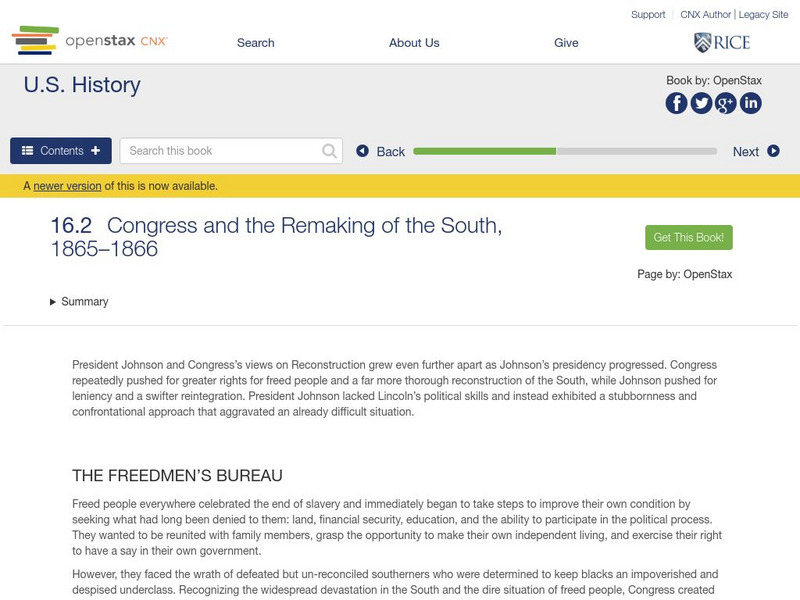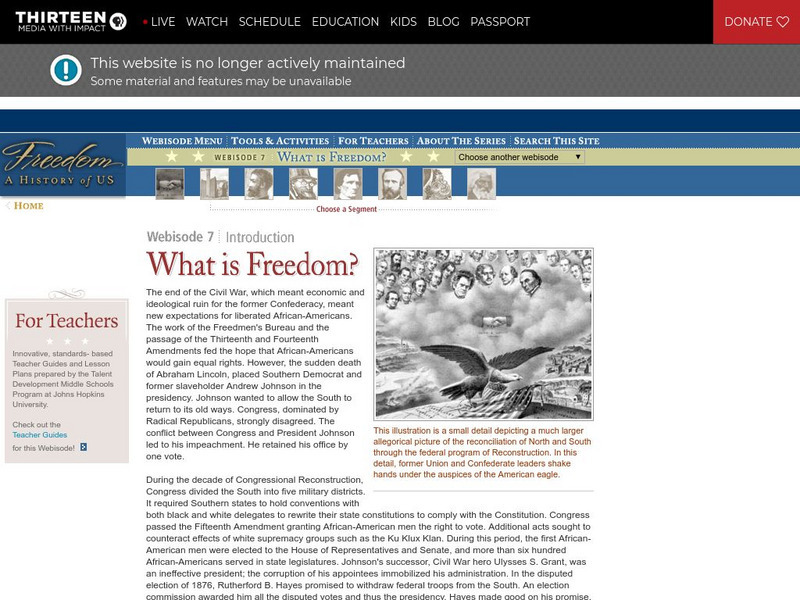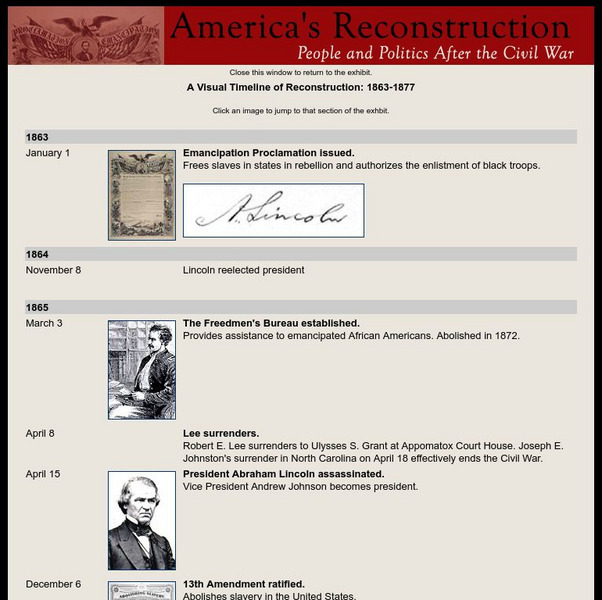Core Knowledge Foundation
The Civil War
A unit covers many aspects of the Civil War. Over six weeks, fifth graders delve deep into the history of slavery, the Civil War—before, during, and after—Abraham Lincoln, women's contributions, the Emancipation Proclamation, and...
Core Knowledge Foundation
The Civil War
A student reader shares information about the history of slavery, the Civil War, President Abraham Lincoln, women's contributions to the war, the Emancipation Proclamation, and reconstruction.
C3 Teachers
Reparations: Why Are Reparations Controversial?
To understand why the topic of reparations is controversial, young scholars gather background information by reading articles, watching videos, and examining cases where reparations were made. Learners consider the lasting repercussions...
K20 LEARN
Deconstructing Reconstruction: The Reconstruction Era
High schoolers examine the Reconstruction programs instituted following the American Civil War, the potential for change these efforts offered, and the realities that occurred. Guided by a PowerPoint presentation, class members read a...
Anti-Defamation League
The Road to Brown
As part of the study of segregation in U.S. schools, scholars research and create a timeline of events that led to the historic Supreme Court case, Brown V. Board of Education. Groups research a topic or event that led to the decision,...
K20 LEARN
The Bank Of Justice: Civil Rights In The US
To launch a study of racial segregation and integration, young historians first watch a news video about a prom in Georgia that was first integrated in 2013. They then compare the goals in Lincoln's Gettysburg Address to King's "I Have a...
Academy of American Poets
Teach This Poem: "Black Laws" by Roger Reeves
After investigating the Black Lives Matter movement, class members do a close read of Roger Reeves' "Black Laws." They write down words and phrases that rhyme, consider the kinds of rhymes used and their function in the poem. Scholars...
Facing History and Ourselves
The Legacies of Reconstruction
The final activity in the seven-resource Reconstruction Era collection examines the legacies of Reconstruction. Class members investigate why the period has been called an "unfinished revolution," "a splendid failure," and "the second...
Facing History and Ourselves
The Political Struggle, 1865-1866
Healing versus justice. The central source of tension following the United States Civil War was between the demands for healing and the demands for justice, the battle between President Andrew Johnson and Congress. A video introduces the...
Facing History and Ourselves
Defining Freedom
The Emancipation Proclamation freed slaves in the Confederate states. The Thirteenth Amendment banned slavery in the United States. However, neither document defined freedom. The second lesson in the Reconstruction Era series examines...
C-SPAN
14th Amendment Equal Protection Clause
Two Supreme Court cases, Plessy v. Ferguson and Brown v. Board of Education take center stage in a lesson about the Equal Protection Clause of the 14th Amendment. Class members research both cases to compare and contrast the rulings.
Carolina K-12
African Americans in the United States Congress During Reconstruction
The Civil Rights Act of 1866, which granted citizenship to all males in the U.S., resulted in the first African Americans to be elected to Congress. Class members research 11 of these men, the challenges they faced, and craft...
Curated OER
The Called Themselves the K.K.K.; The Birth of an American Terrorist Group
How did Ku Klux Klan develop and flourish in the US? How did the government respond to acts of terrorism conducted by the KKK following the Civil War? How does the government respond to acts of terrorism today? This resource...
Curated OER
Reconstruction (1865-1876)
Easily broken into pieces for several class sessions, this presentation is a great way to transition your class out of a Civil War unit and closer to the 20th century. Engaging photographs, including relevant maps and humorous political...
Curated OER
A Lesson on Reconstruction Legislation and Amendments
Students study the legislation and Amendments of Reconstruction period in America. In this Reconstruction lesson plan, students work in groups to dissect the Black Codes, an article in the US Constitution, as well as the 13th, 14th,...
Virginia History Series
Virginia History Series: Virginia State History Reconstruction to 1900 [Pdf]
Much of Virginia was devastated after the Civil War so a period of rebuilding commenced. Follow Reconstruction through the different plans, the effects on African-Americans and the South. This slideshow has pictures,charts, and maps to...
Other
University of Western Georgia: Reconstruction in the South
An excellent distillation of the many issues addressed in the Reconstruction period in the South in the twelve years after the end of the Civil War.
Texas State Library and Archives Commission
Texas State Library and Archives Commission: Forever Free: The 1860s: 19th Century African American Legislators of Texas
An exhibit from the Texas State Library exploring the political achievements of African-Americans in the Texas state legislature and Constitutional Convention from 1865 through the 1890s.
OpenStax
Open Stax: Congress and the Remaking of the South, 1865 1866
This section from a chapter on "The Era of Reconstruction" describes the efforts made by Congress in 1865 and 1866 to bring to life its vision of Reconstruction and explains how the Fourteenth Amendment transformed the Constitution.
PBS
Wnet: Thirteen: Freedom: A History of the u.s. What Is Freedom? Webisode 7
Webisode 7 - What is Freedom? ..The history of the United States is presented in a series of webisodes, within each are a number of segments.Included are links to lesson plans, teacher guides, resources, activities, and tools.
Other
Jim Crow Museum of Racist Memorabilia: What Was Jim Crow?
A listing of the Jim Crow laws and understood Jim Crow etiquette found across the South in the late 19th century.
Digital History
Digital History: America's Reconstruction: A Visual Timeline of Reconstruction
This resource provides a timeline of the Reconstruction era in the South.
Digital History
Digital History: Two Plans for Reconstruction [Pdf]
Before his assassination, Abraham Lincoln was already making plans for Reconstruction in the South. Read about his plan and the plan of the Radical Republicans. See the reasoning behind each plan.
Digital History
Digital History: The Problem of Reconstruction [Pdf]
How does a country put itself back together after a civil war? Read about the problems with the destruction of the Southern economy and land, the recognition of former slaves as freedmen, and the ways to bring the Southern states back...















![Virginia History Series: Virginia State History Reconstruction to 1900 [Pdf] PPT Virginia History Series: Virginia State History Reconstruction to 1900 [Pdf] PPT](https://static.lp.lexp.cloud/images/attachment_defaults/resource/large/FPO-knovation.png)




